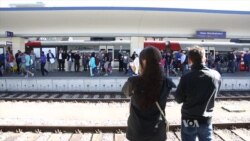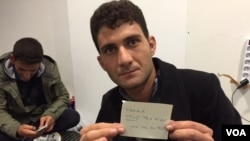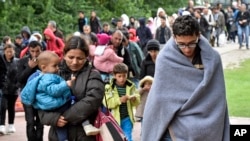Europe is preparing for a new wave of refugees as word filters back to others that the passage through Hungary is now easier.
Hundreds arrived Sunday at Vienna’s Westbahnhof station aboard trains from the Hungarian border, after officials in Hungary decided to allow thousands of refugees who had been stranded in Budapest to travel by train to the border.
Trains carrying refugees from the Hungarian border town of Hegyeshalom were met by cheers and applause from Austrian onlookers waiting on the station platform.
Hungary
It was a far cry from their experience in Hungary, where police last week tear-gassed the migrants and prevented them from reaching Austria.
Thousands had camped at Budapest’s Keleti station as trash built up and portable toilets overflowed. By Sunday morning, most of the refugees had left the terminal.
In Vienna, Austrian relief workers and other volunteers offered tea, cigarettes, candy, food, clothing and blankets to the migrants.
Abdulmalik al-Khaled, a medical student fleeing Syria, said he could not believe the warm welcome he received when he got off the train.
"It is very, very, very good," he said, as he prepared to leave for Germany, where he hopes to get help from the German government to continue work on his medical degree. “If I don’t want to complete my studies, I want to stay here.
"But Germany may be better than here to complete (my) studies, so I will travel to there. But it’s better here, in my opinion. Look, everybody is welcome in this country," Khaled said.
Biggest concerns
Some in Europe are expressing concerns that the massive influx of mostly Muslim refugees may dramatically change the demographics of their continent, where low birth rates suggest the native population is not due to replace itself in the next generation.
Denise Neuhauser, a 30-year-old Austrian volunteer handing out candy on the station platform, said those are not immediate concerns.
“I really don’t know what the bigger picture is, but right now, take care of the people, give them food, give them drink, give them shelter and let them pass through," Neuhauser said.
For most refugees arriving at the station Sunday, the passage was remarkably efficient, with Austrian police and railway workers helping the migrants transfer directly to another platform where they immediately boarded trains for Germany.
Khaled and his cousins relaxed in a room next to the platform as they recharged their smart phones.
One of the first calls he planned to make was to his cousin, who is making the same journey and is now waiting in Macedonia before seeing whether it is possible to make the trek through Serbia and then to cross to Hungary.
“I (will) tell him when he arrives here, here is better than any country. I will tell him that," he said.
Concerns
Hungarian leaders are expressing concern that the news of easier passage will encourage more migrants to make the journey and have been fortifying the fence along the border with Syria, where most of the migrants have been entering illegally.
Hundreds continued to cross the border from Serbia into Hungary Sunday.
Austria, meanwhile, said it planned to eventually phase out emergency measures that have made it possible for the migrants to cross the border from Hungary.
"We have always said this is an emergency situation in which we must act quickly and humanely," Austrian Chancellor Werner Faymann said Sunday. "Now we have to move step-by-step away from emergency measures towards normality in conformity with the law and dignity."
Faymann spoke Sunday with German Chancellor Angela Merkel – who threw her country's doors wide open to the migrants – and Hungarian Prime Minister Viktor Orban, whose government is building a razor wire fence along the Serbian border to keep out the migrants.
Desire to go home
Syrian refugees interviewed in Vienna overwhelmingly expressed a desire to go home, but said that will not be possible as long as the war between the government of Bashar al-Assad and rebel groups continues.
Khaled puts that responsibility on the United States.
He had a message for U.S. President Barack Obama: “If you want to stop this problem, you have to stop the war. You can do that. I know that. You can.”
Those sentiments were echoed by Duried Bawadkji a Syrian-born resident of Hungary who turned out at the Hegyeshalom border crossing between Hungary and Austria on Sunday to volunteer and help direct the migrants.
Bawadkji said the Obama administration’s support for democratic change in Arab countries has gone wrong. In Syria, he said, the so-called Arab Spring has brought tragedy.
“They are the ones responsible of doing this. Because when you encourage people to go in the streets, either you go and help them and finish the story as you have done in too many countries, or don’t do anything like this. Just leave people alone. Leave it how it was," Bawadkji said.
For thousands of Syrians, the only option for now is to flee.







